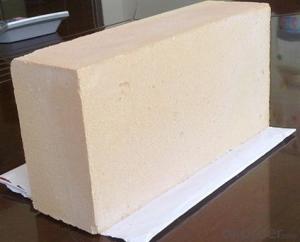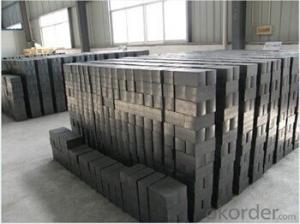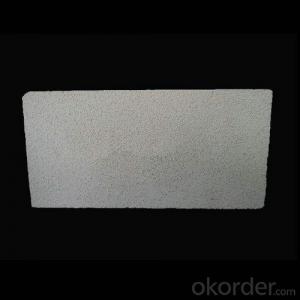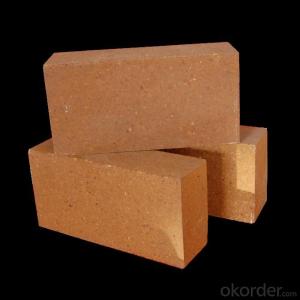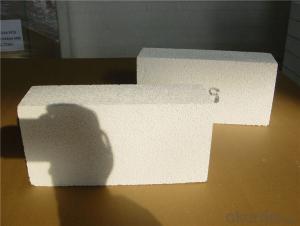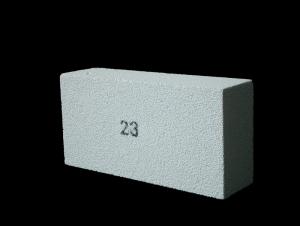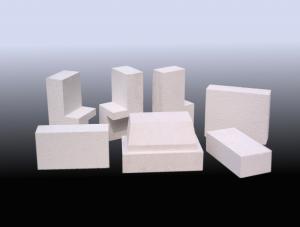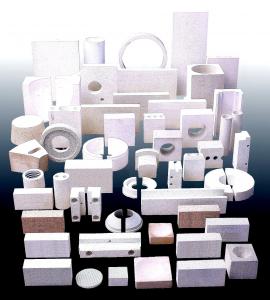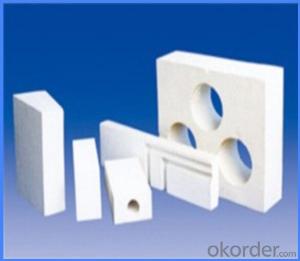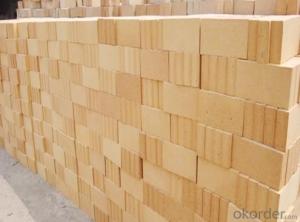Manufacturer of Clay Brick Fire Clay Insulation Brick/ Insulation Fire Brick for Glass Furnace
- Loading Port:
- Tianjin
- Payment Terms:
- TT OR LC
- Min Order Qty:
- 20 m.t.
- Supply Capability:
- 10000 m.t./month
OKorder Service Pledge
OKorder Financial Service
You Might Also Like
CNBM conforms strictly to the requirements of ISO 9000 quality control system during the production. MSDS is also available if you want. The thermal insulation fire clay brick meet with the requirements of ASTM & JIS standards. So pls stay cool with our quality.
Insulating Fire Brick Technical index
Product No. | IFB70 | IFB60 | IFB50 | IFB40 |
Al2O3 | 68%-72% | 58%-62% | 48%-52% | 38%-40% |
Refractoriness (°C ) | ≥1790 | ≥1790 | ≥1790 | ≥1790 |
Bulk density (g/cm3) | 2.50-2.60 | 2.35-2.45 | 2.20-2.30 | 2.10-2.20 |
Apparent porosity (%) | 22 | 19-22 | 17-20 | 17-20 |
Cold Crushing strength (kg) | 480-510 | 450-480 | 430-450 | 390-430 |
Application
Insulating Fire Brick are used for the lining of converter, alternating current arc furnace, direct Current arc furnace and the ladle slag line, etc.
Equipment
1 unit of Ceramic Abrasive (SG Abrasive) pilot production line
2 units of Compact grain Abrasive pilot production lines
1 unit of high-end coated abrasives (abrasive cloth) production line
2 units of Boron Carbide production lines
3 large flexible crushing and sieving lines for grit production lines
2 units of 2000KVA furnaces for Boron Carbide fusion
6 units of 5000KVA-10000KVA dumping type electric arc furnaces for Brown Fused Alumina fusion
Company Advantage
(1)Long Insulating Fire Brick manufacture history: 25 years manufacturer
(2)Advanced equipment
(3)Diversification of production standards: ISO ANSI FEPA JIS ASTM
(4)Flexible payment: T/T L/C D/P D/A
(5)Professional marketing team and after-sale service
(6)Free sample
FAQs
Q1 |
What’s the transport method? |
A1 | FCL delivery goods with wooden pallet or wooden case by sea; If LCL delivery, must with wooden case; Sometimes need open top, flat rack or bulk cargo. |
Q2 |
What’s the required payment term? |
A2 | Generally 30% TT as the prepayment, 70% TT before delivery. If need, 100% Irrevocable Letter of Credit or negotiation. |
Q3 |
Which country are our products exported to? |
A3 | Apart from entire Chinese market, the US, Russia, Japan, Korea, Australia and some Southeast Asian Nations. |
- Q:Are insulating fire bricks resistant to vermin infestation?
- Yes, insulating fire bricks are typically resistant to vermin infestation. These bricks are made from materials such as ceramic fibers, which do not provide a suitable environment for pests to inhabit or cause damage. Additionally, their dense composition and high-temperature resistance make it difficult for vermin to penetrate or chew through them.
- Q:How do insulating fire bricks help to conserve energy?
- Insulating fire bricks help to conserve energy by providing excellent thermal insulation, reducing heat loss and improving energy efficiency. These bricks have low thermal conductivity, which means they are highly resistant to heat transfer. As a result, they prevent the escape of heat from furnaces, kilns, or other high-temperature applications, allowing for better heat retention and reduced energy consumption.
- Q:Are insulating fire bricks resistant to high-velocity gas flow erosion?
- Yes, insulating fire bricks are generally resistant to high-velocity gas flow erosion. These bricks are specifically designed to withstand extreme temperatures and harsh conditions, including erosive environments. They are made from high-quality refractory materials, such as alumina and silica, which have excellent resistance to erosion and corrosion. Additionally, insulating fire bricks have a low thermal conductivity, which helps to reduce heat loss and maintain their structural integrity even under high-velocity gas flow. However, it is important to note that the exact resistance may vary depending on the specific composition and manufacturing process of the insulating fire bricks.
- Q:Can insulating fire bricks be used in high-velocity gas flow applications?
- Yes, insulating fire bricks can be used in high-velocity gas flow applications. Insulating fire bricks are designed to withstand high temperatures and provide excellent thermal insulation. They are commonly used in furnaces, kilns, and other high-temperature environments. Their insulating properties make them suitable for applications with high-velocity gas flow, as they can help minimize heat loss and maintain temperature stability.
- Q:How durable are insulating fire bricks?
- Insulating fire bricks are renowned for their remarkable strength and endurance. These bricks are crafted from top-notch refractory materials like alumina and silica, which possess superb thermal resistance and mechanical robustness. As a result, insulating fire bricks can endure extreme temperatures ranging from 1300°C to 1800°C (2372°F to 3272°F) without compromising their structural integrity. The durability of insulating fire bricks can be attributed to several key factors. Firstly, their low thermal conductivity enables them to effectively insulate heat and prevent thermal shock, which is pivotal for ensuring their long-term sturdiness. Additionally, the high melting point of the refractory materials utilized in their production enhances their ability to withstand intense heat. Furthermore, insulating fire bricks exhibit resistance against chemical erosion and corrosion, making them ideal for diverse industrial applications. They can withstand exposure to harsh chemicals, acids, and alkalis, guaranteeing their durability even in demanding environments. Moreover, insulating fire bricks possess a low density, rendering them lightweight and less prone to cracking or breaking under pressure. This characteristic heightens their durability and facilitates ease of handling during installation or maintenance. In summary, insulating fire bricks are exceedingly durable and capable of withstanding extreme temperatures, thermal shock, chemical erosion, and mechanical stress. Their exceptional durability positions them as the preferred choice for applications such as furnaces, kilns, ovens, and other high-temperature environments where thermal insulation and long-lasting performance are imperative.
- Q:Do insulating fire bricks require any special fireproof gaskets or seals?
- No, insulating fire bricks do not require any special fireproof gaskets or seals. Insulating fire bricks are designed to have a high resistance to heat and can withstand high temperatures without the need for additional gaskets or seals. These bricks are typically used in applications such as kilns, furnaces, and fireplaces, where they provide insulation and help retain heat. Their composition and structure allow them to create a barrier against heat transfer, eliminating the need for any additional seals or gaskets. However, it is important to ensure proper installation and alignment of the bricks to ensure a tight fit and maximize their insulating properties.
- Q:Are insulating fire bricks resistant to alkali attack?
- Yes, insulating fire bricks are generally resistant to alkali attack. These bricks are made from high-temperature refractory materials and are designed to withstand extreme temperatures and chemical environments. Alkalis are known to corrode and degrade certain materials, but insulating fire bricks are specifically formulated to resist this type of chemical attack. They have a low porosity and dense structure, which helps prevent the penetration of alkalis into the brick's surface. Additionally, the refractory materials used in these bricks have a high melting point and are chemically inert, making them well-suited for applications where alkali exposure is a concern. However, it is important to note that the specific resistance of insulating fire bricks to alkali attack may vary depending on the composition and manufacturing process of the brick, as well as the concentration and duration of alkali exposure. Therefore, it is always recommended to consult with the manufacturer or supplier for detailed information about the resistance of their specific insulating fire bricks to alkali attack.
- Q:Are insulating fire bricks suitable for use in wood-fired ovens?
- Indeed, insulating fire bricks are appropriate for utilization in wood-fired ovens. These bricks have been meticulously crafted to endure extreme temperatures, rendering them exceptionally suitable for deployment in ovens or other heat-intensive scenarios. Insulating fire bricks boast exceptional thermal insulation properties, aiding in the preservation of heat within the oven and guaranteeing a more effective cooking procedure. Moreover, these bricks exhibit low thermal conductivity, signifying that they transmit less heat to the external surfaces, resulting in a cooking experience that is both safer and more comfortable. Consequently, the utilization of insulating fire bricks in wood-fired ovens can yield superior heat retention, enhanced energy efficiency, and an overall improved performance.
- Q:Can insulating fire bricks be used in electric furnaces?
- Yes, insulating fire bricks can be used in electric furnaces. Insulating fire bricks are designed to have low thermal conductivity, which makes them ideal for use in applications where heat needs to be contained or insulated. Electric furnaces require insulation to prevent heat loss and improve energy efficiency. Insulating fire bricks can withstand high temperatures and provide excellent insulation properties, making them suitable for use in electric furnaces. Additionally, they are lightweight and easy to install, making them a preferred choice for insulation in electric furnaces.
- Q:Can insulating fire bricks be used in kilns?
- Yes, insulating fire bricks can be used in kilns. They are specifically designed to withstand high temperatures and provide excellent insulation, making them a suitable choice for kiln applications where heat retention is important.
1. Manufacturer Overview |
|
|---|---|
| Location | |
| Year Established | |
| Annual Output Value | |
| Main Markets | |
| Company Certifications | |
2. Manufacturer Certificates |
|
|---|---|
| a) Certification Name | |
| Range | |
| Reference | |
| Validity Period | |
3. Manufacturer Capability |
|
|---|---|
| a)Trade Capacity | |
| Nearest Port | |
| Export Percentage | |
| No.of Employees in Trade Department | |
| Language Spoken: | |
| b)Factory Information | |
| Factory Size: | |
| No. of Production Lines | |
| Contract Manufacturing | |
| Product Price Range | |
Send your message to us
Manufacturer of Clay Brick Fire Clay Insulation Brick/ Insulation Fire Brick for Glass Furnace
- Loading Port:
- Tianjin
- Payment Terms:
- TT OR LC
- Min Order Qty:
- 20 m.t.
- Supply Capability:
- 10000 m.t./month
OKorder Service Pledge
OKorder Financial Service
Similar products
New products
Hot products
Related keywords
